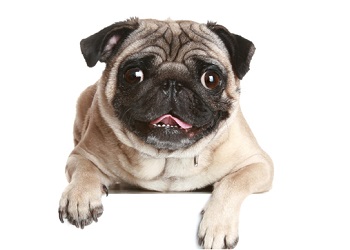 One of the oldest breeds, Pugs are said to be originated in China at around 700BC. They were introduced to Europe around the 13th century and eventually became a pet of Dutch royalty as the official dog of the House of Orange in Holland.
One of the oldest breeds, Pugs are said to be originated in China at around 700BC. They were introduced to Europe around the 13th century and eventually became a pet of Dutch royalty as the official dog of the House of Orange in Holland.
Prince William II owned Pugs – one of which is said to have saved his life in 1572 when alerting to approaching Spaniards. In 1860, the Chinese Imperial Palace was taken over by the British and they discovered Pugs and then they took them back to England with them.
Today, Pugs are much-loved and delightful pets that love to please their family.
Pugs are a loving and faithful companion with a sense of humor and zest for life
Personality
Pugs are very friendly, people-loving dogs that are loyal and affectionate with their families. They are also playful, lively and have a great sense of humor.
They can be, however, somewhat headstrong, getting bored easily without a variety in their training. Pugs enjoy being included in family activities.
Pugs are good watchdogs, very devoted to their family and are not yappers. Their independent and stubborn attitudes make them challenging to train at times.
Upkeep
A pug’s smooth, short-haired coat is easy to groom. Brush weekly and shampoo only when necessary. The creases on the face must be checked and cleaned regularly. Pugs are seasonally heavy shedders. Pugs can be miserable in cold and hot weather. During warmer months, keep an eye out for possible breathing problems and ensure they are not stressed. They are a brachycephalic breed and prone to heat stroke.
Pugs do not require extensive exercise, but need a daily walk to keep healthy and fit. They also enjoy energetic games, like fetching a ball. Be cautious not to over exercise Pugs, especially if you see them start to pant heavily. Do not exercise your pug in the heat of the day.
Compatibility
Pugs generally get along with anyone, including children and visitors. They also enjoy the company of other dogs and pets. Pugs are suited for apartment life. They are relatively inactive indoors and will do fine without a yard.
Fact file
Breed classification Toy
Size Small
Origin Asia
Lifespan 12-15 years
Colors Fawn (all variations), Apricot and Black, Fawn and Apricot should have black mask
Cost $1200 – $1800. Common health problems for a list of health problems known to have occurred in individual dogs within the breed.
